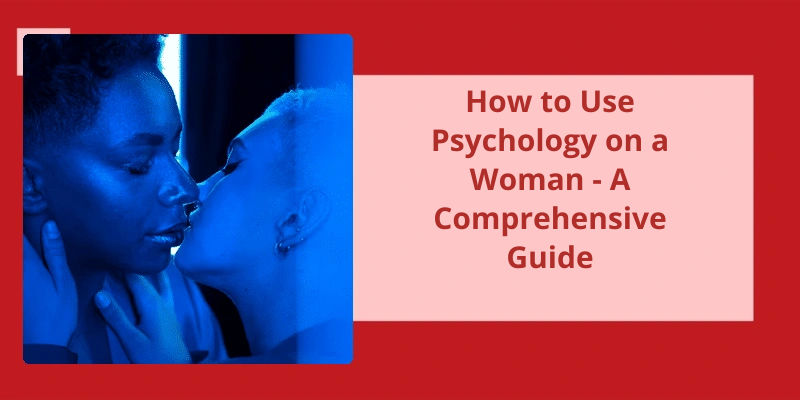The art of attraction is laced with intricacies and nuances that are unique to every individual. However, there are certain psychological tips and tricks that can be employed to affect the way women perceive and respond to you. These tips are based on the fundamental principles of human psychology and can be adapted to suit any situation or personality type. From using body language to increase oxytocin levels, to employing humor and touch to make her feel special, these tips will help you better understand and use psychology to your advantage when trying to attract women.
What Is the Psychology of Someone?
The psychology of someone can vary greatly from individual to individual. Each person has unique experiences that shape their thoughts, feelings, and behaviors. However, there are certain universal patterns and tendencies that can be observed in human psychology. For example, people tend to seek out social connections and strive for a sense of belonging. They also have a natural inclination towards self-preservation and will often prioritize their own needs and interests.
One of the key factors that influences a persons psychology is their upbringing and environment. Childhood experiences, family dynamics, and cultural influences can all play a role in shaping a persons personality and worldview. Traumatic events or difficult life circumstances can also have a significant impact on a persons mental health and emotional well-being.
Another important aspect of psychology is the role of cognitive processes. How a person thinks about themselves, others, and the world around them can influence their beliefs, attitudes, and behaviors. For example, someone with negative self-talk or a pessimistic outlook may struggle with low self-esteem or depression. Conversely, someone with a positive mindset and optimistic outlook may have better mental health and greater resilience in the face of challenges.
In addition to cognitive processes, emotions are also an integral part of human psychology. Emotions can be both positive and negative, and can range from joy and happiness to anger and sadness. How a person manages and regulates their emotions can have a significant impact on their mental and physical health. For example, chronic stress or anxiety can lead to a variety of health problems, while emotional regulation tools such as mindfulness and meditation can have positive effects on mental health and well-being.
Ultimately, the psychology of someone is a complex and multifaceted topic that encompasses many different aspects of human experience. Understanding the science of mind and behavior can help individuals gain insights into their own thoughts, feelings, and behaviors, as well as those of others around them. By studying psychology, individuals can learn valuable skills and tools to help them navigate the complexities of human relationships, cope with adversity, and improve their overall quality of life.
By understanding human behavior, psychology has become a useful tool for individuals seeking to better themselves and their relationships with others. Whether it’s through therapy, self-reflection, or applying principles of psychology in their daily lives, people are using psychology to gain insight into themselves and others.
How Do People Use Psychology?
People often use psychology as a way to better understand themselves and the people around them. By studying the way our brains process information and emotions, individuals can gain valuable insights into their own thought processes and behaviors. There are countless applications for this knowledge, including improving personal relationships, identifying and managing mental health conditions, and even enhancing job performance and productivity.
One key area where psychology is commonly used is in counseling and therapy. Licensed psychologists can work directly with individuals, couples, or families to help them address a range of social, emotional, and behavioral issues. Through a variety of therapeutic techniques, therapists can help individuals explore their feelings and develop coping strategies for managing difficult emotions and situations.
Another important use for psychology is in the field of education. With a deeper understanding of how the brain learns and processes new information, teachers and educators can create more effective teaching methods and curricula. For example, by applying principles of cognitive psychology, teachers can design lessons that help students retain information more easily and learn more efficiently.
Psychology is also a key component of many workplace training and development programs. By studying human behavior and motivation, managers and HR professionals can create effective strategies for recruiting and retaining top talent, as well as for fostering a positive and productive work environment. Additionally, understanding how people think and behave can be invaluable in marketing and advertising, where psychology is often used to develop effective messages and branding strategies.
Finally, psychology is an essential tool for law enforcement and the criminal justice system. Forensic psychologists, for example, may work with law enforcement to develop offender profiles or to assess the mental health of suspects. Additionally, psychological research can help inform criminal justice policies and practices, such as the use of solitary confinement or the effectiveness of community-based criminal justice programs.
Overall, psychology plays an essential role in our understanding of human behavior and it’s many applications across different fields and industries. By studying psychology and applying it’s insights and principles in various contexts, individuals can gain a deeper understanding of themselves and the world around them, and work to create positive change and meaningful progress in their personal and professional lives.
Source: Importance of Psychology Today | What’s happening at UDC!
Conclusion
Overall, understanding the nuances of human psychology can be a powerful tool when trying to attract and connect with women. These nine tips may seem simple on the surface, but they all tap into fundamental psychological principles that have been shown to be effective in many different contexts. By presenting yourself as an open, friendly, and reliable person who genuinely cares about others, you can create a positive and attractive image in the eyes of women. And by taking the time to find common ground, offer sincere compliments, and spark laughter and positive emotions, you can build trust and intimacy over time. Ultimately, the key to using psychology on a woman is to be authentic, confident, and respectful, and to communicate your intentions clearly and honestly.






